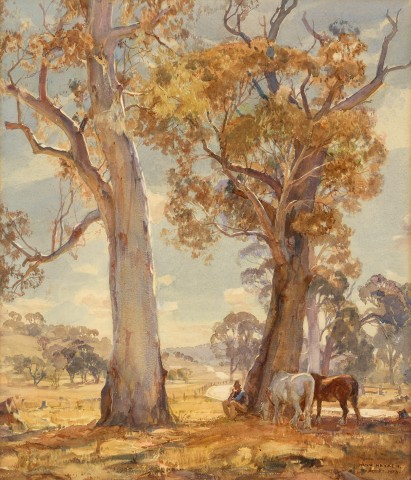MORNING BREAK, 1922
HANS HEYSEN
watercolour on paper
66.0 x 56.0 cm
signed and dated lower right: HANS HEYSEN / 1922
bears inscription verso: “Morning Break” / Hans Heysen / W-224 – D.H.H.
Private collection
Sotheby’s, Melbourne, 19 August 1991, lot 345
Private collection, Melbourne
Lauraine Diggins Fine Art, Melbourne (label attached verso)
Private collection, Melbourne, acquired from the above in 2003
The Seasons in Australian Art, Lauraine Diggins Fine Art, Melbourne, 20 November – 18 December 1999 and touring, cat. 39
Annual Collectors’ Exhibition 2003, Lauraine Diggins Fine Art, Melbourne, 6 September – 5 October 2003, cat. 11
Noonday Rest, 1922, watercolour on paper, 56.0 x 65.0 cm, private collection, illus. in Thiele, C., Hans Heysen Masterpieces, Rigby Publishers, Adelaide, 1977, p.25
The watercolour Morning Break, 1922 is a classic Hans Heysen. Presenting many of his favourite themes, especially the well-earned rest after physical labour, his gums are forever noble and the bountiful landscape is filled with the interplay of sparkling sunlight and restful shadows. For good measure, he adds his leit motif of seated man and resting animals (in this watercolour, draught horses) enjoying a break from work within the protective shield of broad trunked trees. It calls to mind other such notable works as the oil paintings A Summer’s Day, c.1907, acclaimed as ‘the landscape of the year’ when exhibited n Sydney in 1907, Morning Light, 1913 in the National Gallery of Australia, Canberra, and The Three Gums, 1914-21 in the Art Gallery of Ballarat.1 His characteristic approach of painting into the light enables the striking contrast of shaded foreground with sun-filled background of open fields, rolling hills and meandering roads. In October 1920 Heysen wrote to his friend Lionel Lindsay: ‘…it is good to feel the sun warming the earth and flooding its light over everything……and it is good to feel man and horses working in it too.’2 The grandeur of the scene is heightened by depicting the gums from a lower viewpoint, figures of man and beast diminutive by comparison. Mastery of composition is even seen in such detail as the reflected patterns of shaded foreground in the upper tracery of branches against the open sky, linked by, as Heysen observed separately: ‘the pattern of the bark on the trunk of a gum’.3 Enabled by his intense observation and magnificent draughtsmanship, critics have long been impressed by the ‘truth’ of Heysen’s vision’, combined with poetic insight and clarity of expression.4
Entering his golden age, Heysen’s watercolours of the early 1920s are among his finest. Watercolours won him the Wynne prizes for 1920, 1922 and 1924 -The Toilers, The Quarry and Afternoon in Autumn respectively. The oil painting The Farmyard, Frosty Morning won the award for 1926, making up four among his nine Wynne prizes. The Toilers remained in Heysen’s personal collection until bequeathed to the Art Gallery of South Australia in 1968. The Quarry and Afternoon in Autumn had been earlier snapped up by the Art Gallery of New South Wales; and The Farmyard, Frosty Morning was part of the collection of Sir Warwick and Lady Fairfax, Sydney.
In September 1922, at the Institute Building, Adelaide, Dame Nellie Melba opened a glittering exhibition of Heysen’s work consisting mainly of watercolours. It was ‘the first major exhibition of his work in his native Adelaide [and] reached the incredible total of £3,600’, an astronomical figure for those days.5 ‘- 38 of the 55 catalogued works … were sold by the end of the first day’.6 Melba was one of the buyers. Of the forty watercolours listed in the printed catalogue, none carried the same title as our work. Two illustrations of watercolours in the catalogue, however, show Morning Break, 1922 to be of similar thematic interests and exceeding artistic excellence.
1. A Summer’s Day was sold for the record price of $601,364 by Deutscher and Hackett, Melbourne, 15 July 2020, lot 14
2. Heysen letter to Lionel Lindsay, 7 October 1920, quoted in Thiele, C, Heysen of Hahndorf, David Heysen Productions, Hyde Park Press, Adelaide, 2001, p. 291
3. Heysen, quoted in Thiele, ibid, p. 312
4. ‘Royal Art Society’, The Lone Hand, Sydney, 1 October 1907, p. 596
5. Thiele, op. cit., p.186
